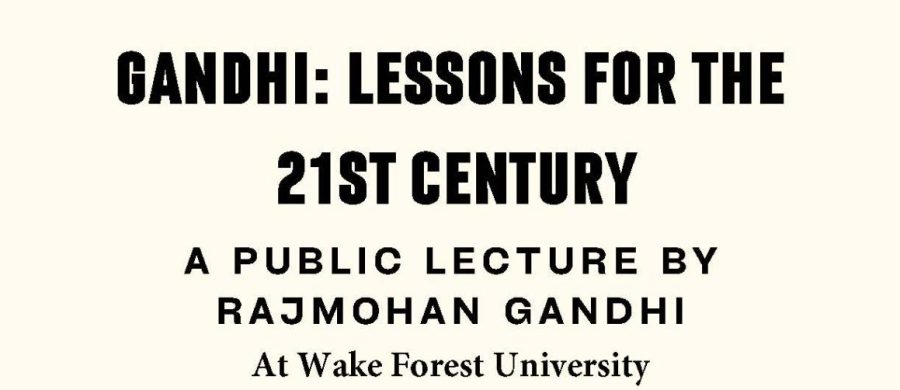Rajmohan Gandhi’s second event focuses on modern lessons
The event featured a lively Q&A
A flyer details Rajmohan Gandhi’s talk.
March 23, 2023
Professor Rajmohan Gandhi gave a lecture titled “Gandhi: Lessons for the 21st Century” on March 15 — his second event at Wake Forest that week. Held in Annenberg Forum, the lecture hall was filled with people eager to learn from Mahatma Gandhi’s grandson.
Rajmohan Gandhi is a historian and biographer who currently serves as a research professor at the College of Education at University of Illinois at Urbana-Champaign. He has written many books and was also a member of the Rajya Sabha, the upper house of the Indian Parliament.
During his lecture, Rajmohan Gandhi focused on Mahatma Gandhi’s lessons and how they could be applied in the 21st century. He emphasized aspects of Mahatma Gandhi’s life that led him to combat oppression with nonviolence.
“It appears that a number of ingredients must come together in order to produce a consequential non-violent action,” Rajmohan Gandhi said.
He also discussed the various religions present in India and explained how Mahatma Gandhi encouraged peaceful coexistence among religions. Rajmohan Gandhi quoted his grandfather, who believed that one’s nationality does not determine their religion.
“Those who are conscious of the spirit of nationality do not interfere with one another’s religion,” Rojmohan Gandhi said, quoting his grandfather. “In no part of the world are one nationality and one religion synonymous terms, nor has it ever been so in India.”
The end of the event was dedicated to answering attendants’ questions. Many students were concerned about current social justice issues. One student asked Rajmohan Gandhi how we can resist the attack on pluralism — acknowledging and affirming diversity within a political body.
“We have opinions about other groups,” Rajmohan Gandhi said. “We don’t have knowledge about them. We don’t listen to them. We don’t read the books they write. If you want to defend independence, you can start by creating really powerful, diverse groups where they can really get to know each other.”
Audience members valued this application of Mahatma Gandhi’s ideas to the current time period.
“I wanted to hear about what he thinks about solutions to the problems that we’re facing in the 21st century,” Department of History Associate Professor Qiong Zhang said.
Rajmohan Gandhi’s aspiration of building solidarity within groups resonated with Zhang, and she left feeling as though he had made an impact on the audience.
“I think his emphasis was on building solidarity among the pluralists and making efforts to understand each other and to understand people who are different from them better,” Zhang said. “I think that’s the greatest message, and I think that comes straight out of the non-violence principle from [Mahatma] Gandhi, his grandfather.”
Another student expressed curiosity about democratic backsliding in India and asked what could help strengthen their democratic legacy. Rajmohan Gandhi reflected on the role that the United States plays in helping to maintain India’s democracy.
“If you can get fellow Americans better informed about what’s happening in India, that’s definitely a gigantic first step,” Rajmohan Gandhi said. “And remember, what the public in the United States thinks matters the most.”
Rajmohan Gandhi concluded the event by challenging audience members to shift their focus away from determining who is right in a conflict.
“You know, sometimes there are very simple truths that we forget,” Rajmohan Gandhi said. “When I was very young, I learned of this magnificent notion that many people are fighting their disputes. Instead of thinking of who is right, let us think of what is right. What is the next step? If you’re always saying who’s right and who’s wrong, that perpetuates division and hostility.”
Graduate student and visiting Fulbright fellow Rimjhim Kumari left Rajmohan Gandhi’s lecture with increased appreciation for of the importance of trying to become educated about a variety of cultures.
“He talked about unifying the world and solidarity,” Kumari said. “We should not judge people based on somebody’s opinion. Instead, we should try to encourage other people to know more about a country”
Zhang echoed Kumari and expressed that everyone is capable of impacting social justice movements.
“We just need to make some small steps to open up our minds to other people, especially people who are different from us in religion, language, culture and race,” Zhang said. “We all can make a difference.”























